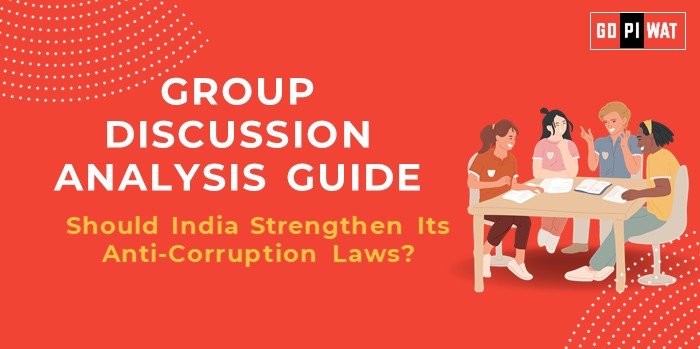📋 Group Discussion (GD) Analysis Guide: Should India Strengthen Its Anti-Corruption Laws?
🌐 Introduction to the Topic
- 💬 Opening Context: Corruption undermines the rule of law, economic progress, and public trust. With India’s expanding economy and global aspirations, robust anti-corruption frameworks are crucial to ensure sustainable development.
- 📜 Topic Background: India’s anti-corruption laws date back to pre-independence, evolving with landmark legislations like the Prevention of Corruption Act, 1988. However, the effectiveness of these laws has been questioned amid persistent issues of bureaucratic and political corruption.
📊 Quick Facts and Key Statistics
- 📉 India’s Rank in Corruption Perceptions Index 2023: 85/180 (Transparency International) – Indicates a moderate to high level of corruption.
- 💰 Annual Loss Due to Corruption: ₹6 trillion (Assocham 2023) – Reflects the economic toll of corruption.
- ⚖️ Cases Pending in Special Anti-Corruption Courts: Over 24,000 – Highlights delays in judicial outcomes.
- 📢 Whistleblower Complaints (2023): Increased by 40% – Signifies growing public awareness but also systemic inefficiencies.
🔍 Stakeholders and Their Roles
- 🏛️ Government: Enacts and enforces anti-corruption laws, sets up vigilance and investigative agencies.
- ⚖️ Judiciary: Interprets laws and ensures timely justice.
- 👥 Citizens: Report corruption and demand accountability.
- 📢 NGOs and Media: Act as watchdogs and amplify anti-corruption efforts.
- 🌍 International Bodies: Offer benchmarks and frameworks for improving governance.
🏆 Achievements and Challenges
Achievements:
- 📜 Transparency in Governance: Initiatives like RTI Act and e-Governance have increased accountability.
- 💳 Digital Reforms: Aadhaar-enabled payments and Direct Benefit Transfers (DBT) reduced leakages by ₹2.7 lakh crore in subsidies.
- 📢 Whistleblower Protection Act: Strengthened reporting mechanisms for corruption cases.
Challenges:
- ⚖️ Political Interference: Cases against high-ranking officials often stalled.
- ⏳ Judicial Delays: Overloaded courts lead to prolonged trials.
- ❌ Weak Enforcement: Lack of comprehensive mechanisms for law enforcement agencies.
Global Comparisons:
- 🇸🇬 Singapore: Exemplary anti-corruption framework with swift justice and high conviction rates.
- 🇸🇪 Scandinavia: Transparent public procurement and low tolerance for unethical practices.
🎯 Structured Arguments for Discussion
- ✅ Supporting Stance: “Strengthening anti-corruption laws is vital for economic growth and public trust. The success of DBT in reducing leakages is a testament to the need for robust frameworks.”
- ⚖️ Opposing Stance: “Stricter laws alone are ineffective without institutional independence and cultural shifts. Judicial reforms and public awareness are equally critical.”
- 🤝 Balanced Perspective: “While stricter laws can deter corruption, their success depends on unbiased enforcement, transparent processes, and citizen participation.”
🗣️ Effective Discussion Approaches
- 📜 Opening Approaches:
- “Singapore’s anti-corruption success is a model India can emulate.”
- “India loses ₹6 trillion annually to corruption, highlighting the urgent need for stronger laws.”
- “Scandals like the 2G Spectrum or Coal Block allocation emphasize the need for systemic reforms.”
- 🔄 Counter-Argument Handling:
- Recognize gaps like enforcement delays but propose solutions, e.g., “Fast-track courts can expedite cases.”
- Highlight public engagement as complementary to legal reforms.
🔍 Strategic Analysis of Strengths and Weaknesses
- 💪 Strengths: E-governance initiatives, public awareness campaigns.
- 🔧 Weaknesses: Weak enforcement, lack of institutional independence.
- 🌟 Opportunities: Digital tools for transparency, global best practices adoption.
- ⚠️ Threats: Political resistance, entrenched bureaucratic corruption.
💼 Connecting with B-School Applications
Real-World Applications: Relevant for projects in ethics, governance, and policy formulation.
Sample Interview Questions:
- 💡 “How can India balance stricter laws with judicial efficiency?”
- 💡 “What role does technology play in combating corruption?”
Insights for B-School Students:
- Emphasize ethical leadership.
- Explore anti-corruption measures as CSR initiatives.


